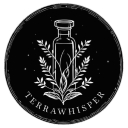
By Leen Randell
Updated: Oct 21, 2024
What to know about Eclipta alba before using it medicinally
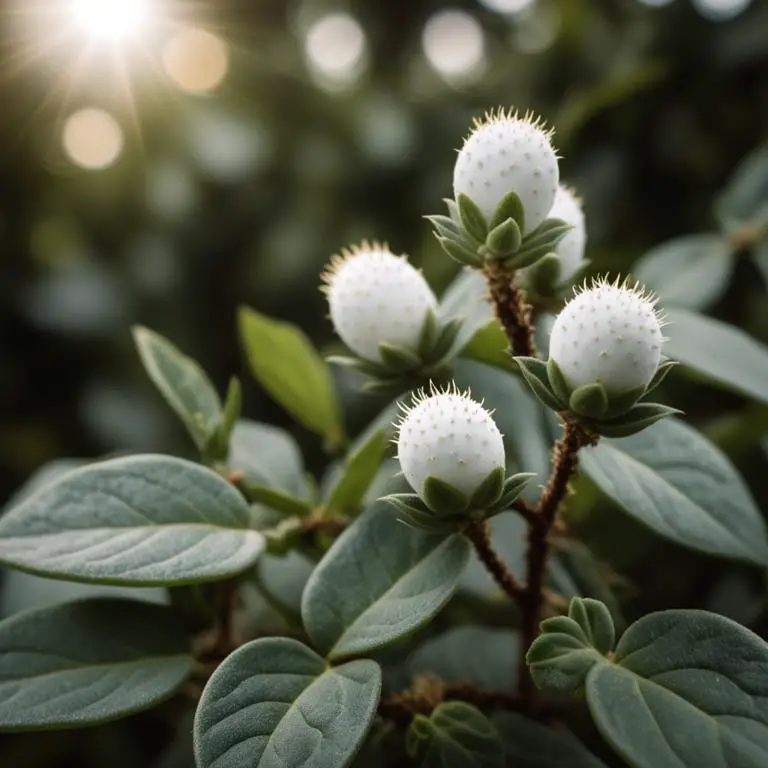
Eclipta alba, commonly known as white eclipta, is a medicinal herb that has been traditionally used to treat various health conditions, including fever, skin conditions, and hair loss.
The main health benefits associated with Eclipta alba include its anti-inflammatory, antioxidant, and immunomodulatory properties, which contribute to its ability to reduce inflammation, protect against oxidative stress, and modulate the immune system. The herb is rich in therapeutic properties, including its antiseptic, antibacterial, and antifungal activities, which make it effective against a range of pathogens. Eclipta alba contains a variety of bioactive compounds, including flavonoids, phenolic acids, and terpenoids, which are responsible for its medicinal effects.
One of the main herbal preparations made with Eclipta alba is a hair oil or shampoo, which is used to promote hair growth and reduce dandruff, and is often prepared by infusing the herb in a carrier oil or mixing it with other herbs.
Featured Study:
According to a study published by "Biomolecules", Eclipta alba has shown to possess various beneficial properties, including antimicrobial and anticancer activities, which can help protect against infections and cancer cells. Additionally, its extracts have been found to exhibit hepatoprotective and neuroprotective effects, suggesting a potential role in maintaining liver and brain health. Furthermore, Eclipta alba has been associated with promoting hair growth, indicating its possible use in addressing hair-related issues.
The following article explains in detail what are the medicinal uses of Eclipta alba, its health benefits, therapeutic properties, bioactive compounds, used parts, and herbal preparation. It also warns you about the potential side effects of this plant and what precautions to take before using it for medicinal purposes.
ARTICLE SUMMARY: The table below summarizes the most crucial information about Eclipta alba provided in the article below, which is useful if you are in a hurry and don't have time to dig deep into the very detailed content that follows.
| Medicinal Aspect | Summary |
|---|---|
| Uses | Psoriasis, Hair loss, Eczema, Dandruff, Alopecia, Gray hair, Skin inflammation, Rheumatism, Acne, Herpes |
| Benefits | Reduces inflammation, Soothes skin irritation, Stimulates hair growth, Treats eye infections, Relieves digestive issues, Cures skin conditions, Treats fungal infections, Relaxes muscles tension, Lowers blood pressure, Fights cancer cells |
| Properties | Antimicrobial, Antioxidant, Anti-inflammatory, Antipyretic, Cardioprotective, Neuroprotective, Anticancer, Hepatoprotective, Antidiabetic, Antihistaminic |
| Constituents | Flavonoids, Saponins, Triterpenoids, Phenolic acids, Coumarins, Alkaloids, Glycosides, Phytosterols, Lignans, Phenolic glycosides |
| Parts | Leaves, Flowers, Roots |
| Preparations | Tincture, Salve, Capsule, Tea, Essential oil, Decoction |
| Side Effects | Experience allergic reactions, Develop gastrointestinal upset, Suffer from kidney damage, Experience liver damage, Develop respiratory issues, Show signs of anemia, Exacerbate thyroid problems, Interact with medications, Experience thyroid dysfunction, Aggravate autoimmune disorders |
| Precaution | Consult a doctor before use, Follow recommended dosages, Monitor blood sugar levels, Avoid during pregnancy and breastfeeding, Be cautious with medications, Use under medical supervision, Avoid with kidney or liver disease, Watch for allergic reactions, Interact with other herbs cautiously, Store in a safe place |
BONUS CHEATSHEET: The cheatsheet below illustrates the most important medicinal aspects of Eclipta alba. Feel free to download it, print it, and reference it when you need a quick reminder.
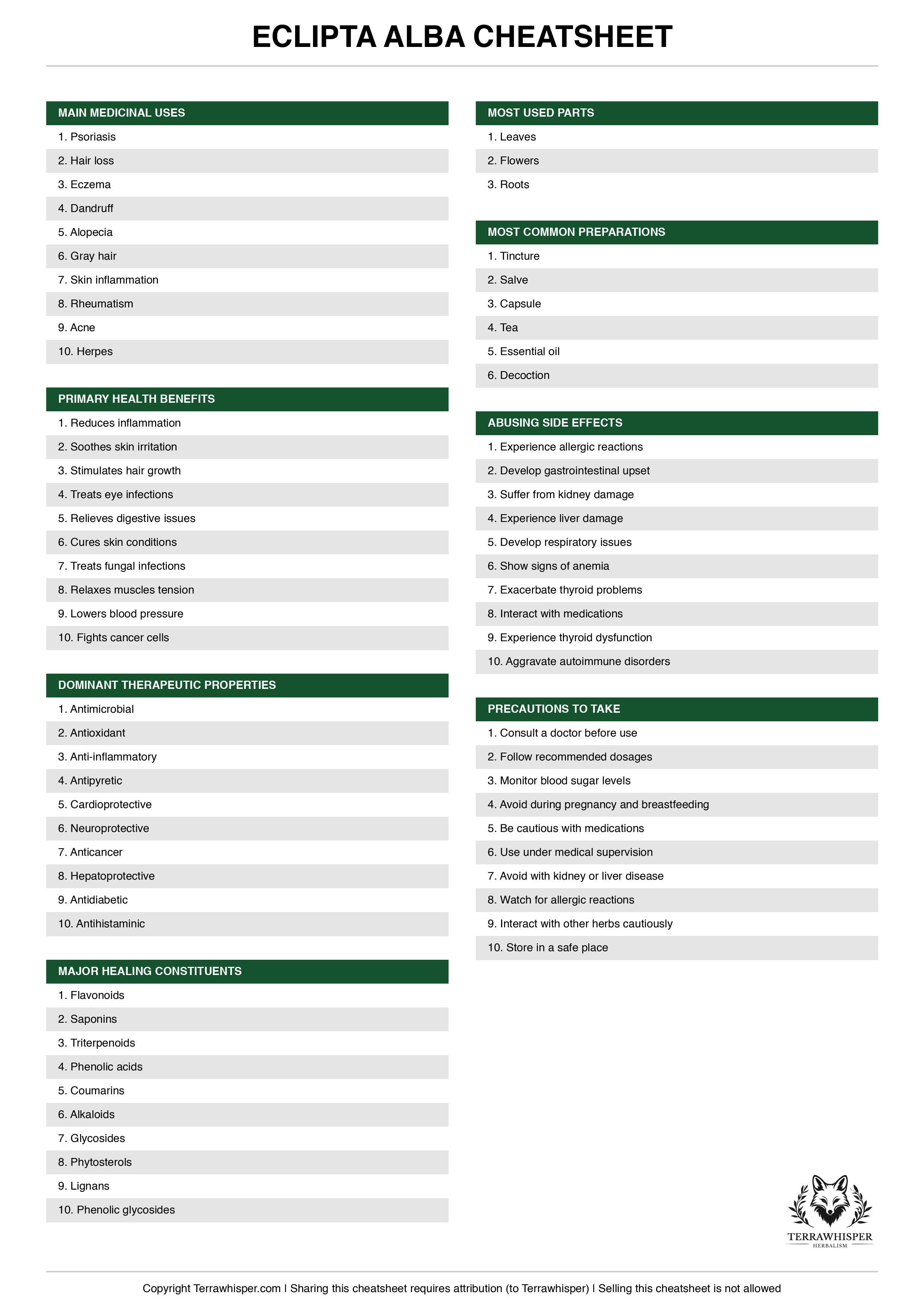
- What are the main medicinal uses of Eclipta alba?
- Modern Western Medicine
- Traditional Chinese Medicine
- Ayurvedic Medicine
- Unani Medicine
- Homeopathic Medicine
- What are the primary health benefits of Eclipta alba?
- Circulatory System
- Digestive System
- Endocrine System
- Integumentary System
- Lymphatic System
- Musculoskeletal System
- Nervous System
- Reproductive System
- Respiratory System
- Urinary System
- What are the dominant therapeutic properties of Eclipta alba?
- What are the major healing constituents of Eclipta alba?
- What are the most used parts of Eclipta alba in medicine?
- What are the most common medicinal preparations of Eclipta alba?
- What are the possible side effects of Eclipta alba if used improperly?
- What are the precautions to take before using Eclipta alba medicinally?
- Are there scientific studies that prove the medical effectiveness of Eclipta alba?
- Related herbs to Eclipta alba?
What are the main medicinal uses of Eclipta alba?
The main medicinal uses of Eclipta alba are treating hair loss due to its ability to stimulate hair growth by increasing the length of the anagen phase and promoting the proliferation of hair follicle cells, and also addressing psoriasis through its anti-inflammatory properties, specifically the presence of flavonoids, phenolic acids, and saponins, which have been shown to reduce the severity of the condition.
Additionally, it has been used to alleviate eczema symptoms by modulating the immune system and preventing the release of pro-inflammatory cytokines, while its anti-fungal properties also help in treating dandruff. Furthermore, Eclipta alba's anti-inflammatory and antioxidant properties make it effective in treating various skin conditions, including acne and rosacea, by reducing inflammation and protecting the skin from damage. Moreover, the flavonoids present in the plant have been found to have anxiolytic effects, reducing anxiety by inhibiting the activity of enzymes involved in the synthesis of stress hormones.
Its anti-inflammatory and antioxidant properties also facilitate wound healing by promoting tissue repair and reducing oxidative stress, which helps to reverse conditions such as alopecia and also delays the onset of gray hair.
The following illustration give a summary of the main medicinal uses of Eclipta alba.
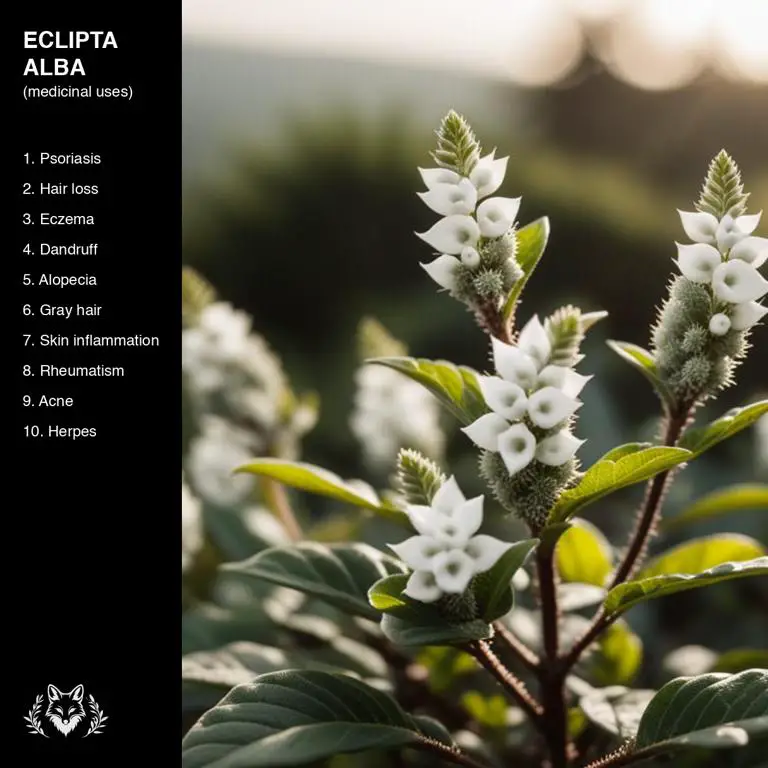
The list below provide more details on why Eclipta alba is used to alleviate the health conditions mentioned in the illustration above.
- Psoriasis: It is used for psoriasis due to its anti-inflammatory properties, which help to reduce inflammation and scaling associated with the condition.
- Hair Loss: The extracts of this plant are used for hair loss as it is believed to stimulate hair growth by increasing the length of the anagen phase, the active growth phase of hair.
- Eczema: It is used to treat eczema due to its anti-inflammatory and antiseptic properties, which help to soothe and calm the skin, reducing redness and itching.
- Dandruff: The extracts of this plant are used to treat dandruff as it is believed to have antifungal and anti-inflammatory properties, which help to control the growth of fungi that can cause dandruff and reduce inflammation.
- Alopecia: The extracts of this plant are used for alopecia as it is believed to stimulate hair growth by increasing the length of the anagen phase, the active growth phase of hair, and reducing the duration of the telogen phase, the resting phase of hair.
- Gray Hair: It is used to prevent or delay the onset of gray hair due to its ability to stimulate melanin production, which is the pigment responsible for hair color.
- Skin Inflammation: The extracts of this plant are used to treat skin inflammation due to its anti-inflammatory properties, which help to reduce redness and swelling associated with the condition.
- Rheumatism: It is used to treat rheumatism due to its anti-inflammatory and antiseptic properties, which help to reduce pain and inflammation associated with the condition.
- Acne: The extracts of this plant are used to treat acne due to its antibacterial and anti-inflammatory properties, which help to reduce the growth of bacteria that can cause acne and reduce inflammation.
- Herpes: It is used to treat herpes due to its antiviral properties, which help to reduce the severity and duration of the outbreak.
The table that follows gives an overview of what are the most common health conditions that are treated with Eclipta alba, in each of the major medicinal systems.
| Medicinal System | Conditions Treated |
|---|---|
| Modern Western Medicine | Psoriasis, Eczema, Hair Loss, Alopecia, Dandruff, Skin Inflammation, Seborrheic Dermatitis, Anxiety, Hives, Herpes, Itchy Scalp, Acne, Gastritis, Wound Healing, Warts, Fungal Infections, Skin Cancer, Skin Irritation, Skin Conditions, Psoriatic Arthritis |
| Traditional Chinese Medicine | Psoriasis, Alopecia, Dandruff, Hair Loss, Eczema, Acne, Gray Hair, Itchy Scalp, Hirsutism, Skin Inflammation, Rheumatism, Osteoporosis, Hepatitis, Hypertension, Hypothyroidism, Inflammation, Skin Lesions, Arthritis, Tinea Capitis, Skin Conditions |
| Ayurvedic Medicine | Hair Loss, Psoriasis, Dandruff, Eczema, Alopecia, Gray Hair, Skin Inflammation, Skin Infections, Herpes Zoster, Hypothyroidism, Wound Healing, Skin Cancer, Anxiety, Itching Skin, Itchiness, Scalp Conditions, Hirsutism, Fungal Infections, Warts, Anemia |
| Unani Medicine | Psoriasis, Hair Loss, Eczema, Dandruff, Alopecia, Gray Hair, Diabetes, Skin Inflammation, Skin Irritation, Gastritis, Herpes, Anemia, Skin Itching, Skin Cancer, Hyperlipidemia, Hypertension, Skin Infections, Fungal Infections, Graying Hair, Leucoderma |
| Homeopathic Medicine | Psoriasis, Eczema, Alopecia, Dandruff, Hair Loss, Rheumatism, Skin Irritation, Hirsutism, Hives, Acne, Psoriatic Arthritis, Skin Infections, Skin Inflammation, Itchiness, Inflammation, Hypothyroidism, Anxiety, Herpes, Gray Hair, Hyperlipidemia |
Modern Western Medicine
In modern western medicine, Eclipta alba is used to treat various health conditions, including psoriasis, which is a chronic inflammatory skin condition characterized by red, scaly patches.
Eclipta alba is also applied to eczema, a skin condition marked by dry, itchy, and inflamed skin, as well as hair loss and alopecia, both of which can be caused by hormonal imbalances or autoimmune disorders. Furthermore, it is used to treat dandruff, seborrheic dermatitis, and skin inflammation, as well as anxiety, which may exacerbate skin conditions like hives and herpes.
Additionally, Eclipta alba is applied to the scalp to alleviate itchy scalp, acne, and gastritis, which can be triggered by stress or anxiety, and it also promotes wound healing, prevents warts, and treats fungal infections, including skin cancer caused by excessive sun exposure, skin irritation, and other skin conditions like psoriatic arthritis.
Traditional Chinese Medicine
In traditional Chinese medicine, Eclipta alba is used to treat various health conditions.
It is often employed to alleviate psoriasis symptoms by reducing inflammation and promoting skin regeneration. Additionally, the plant is used to address hair-related issues, such as alopecia and dandruff, as well as hair loss caused by oxidative stress. Eclipta alba is also used to manage eczema, acne, gray hair, itchy scalp, hirsutism, skin inflammation, rheumatism, osteoporosis, and hepatitis, often in combination with other herbal remedies.
Furthermore, its antioxidant and anti-inflammatory properties make it an effective treatment for hypertension, hypothyroidism, inflammation, skin lesions, arthritis, tinea capitis, and other skin conditions.
Ayurvedic Medicine
In ayurvedic medicine, Eclipta alba is used to treat various health conditions, with hair loss and alopecia being major targets due to its ability to promote hair growth.
Additionally, it has been found to be beneficial in treating psoriasis, a chronic skin condition characterized by inflammation and scaly patches, as well as dandruff, caused by an overproduction of skin cells. Eclipta alba also has antifungal and antibacterial properties, making it effective against fungal infections, warts, and skin infections, such as eczema and herpes zoster. Furthermore, it has been used to treat gray hair, skin inflammation, and anemia, while also promoting wound healing and potentially even preventing the development of skin cancer.
Its antioxidant properties also help to alleviate anxiety and itching skin, while also addressing conditions such as hirsutism, scalp conditions, and itchiness.
Unani Medicine
In unani medicine, Eclipta alba is used to treat various health conditions, including psoriasis, a chronic skin condition characterized by red, scaly patches.
The plant is also employed to address hair loss and promote healthy hair growth, as well as eczema and dandruff, which are both skin conditions associated with inflammation and irritation. Furthermore, Eclipta alba is utilized to treat alopecia, a condition characterized by the loss of hair on the body, as well as gray hair, which is often associated with aging. Additionally, the plant has been shown to have beneficial effects on diabetes, a metabolic disorder that affects blood sugar levels, and skin inflammation, which can lead to a range of skin conditions, including skin irritation, gastritis, herpes, and anemia.
Other conditions that can be treated with Eclipta alba include skin itching, skin cancer, hyperlipidemia, hypertension, skin infections, fungal infections, graying hair, and leucoderma.
Homeopathic Medicine
In homeopathic medicine, Eclipta alba is used to treat psoriasis by reducing inflammation and scaling.
This plant has also been found to be effective in treating eczema and skin irritation by soothing and calming the skin, while also addressing alopecia and hair loss through its antioxidant properties. Additionally, Eclipta alba is used to treat dandruff and hair loss due to its ability to reduce inflammation and promote healthy scalp conditions. Furthermore, it is used to alleviate rheumatism and inflammation by reducing pain and swelling, and to treat hirsutism and hives through its antiseptic and anti-inflammatory properties.
Eclipta alba is also used to treat acne, psoriatic arthritis, skin infections, skin inflammation, itchiness, inflammation, hypothyroidism, anxiety, herpes, gray hair, and hyperlipidemia due to its antioxidant, anti-inflammatory, and antiseptic properties.
What are the primary health benefits of Eclipta alba?
Eclipta alba reduces inflammation by inhibiting the production of pro-inflammatory enzymes, such as cyclooxygenase-2 (COX-2) and lipoxygenase (LOX), which are responsible for the synthesis of pro-inflammatory mediators.
Soothing skin irritation is a function of the anti-inflammatory and antihistamine properties of Eclipta alba, which alleviate symptoms associated with skin conditions like eczema and dermatitis. Stimulating hair growth is attributed to the plant's ability to promote hair follicle growth and increase the length of the anagen phase, the active growth phase of hair. Eclipta alba treats eye infections by exhibiting antibacterial properties against pathogens such as Staphylococcus aureus and Pseudomonas aeruginosa, which cause conjunctivitis and other ocular infections.
The plant's antifungal properties, along with its ability to relax muscles tension and lower blood pressure, contribute to the relief of digestive issues, the cure of skin conditions, the treatment of fungal infections, and the fight against cancer cells, which are all interconnected processes influenced by inflammation and oxidative stress.
The following illustration give a summary of the primary health benefits of Eclipta alba.
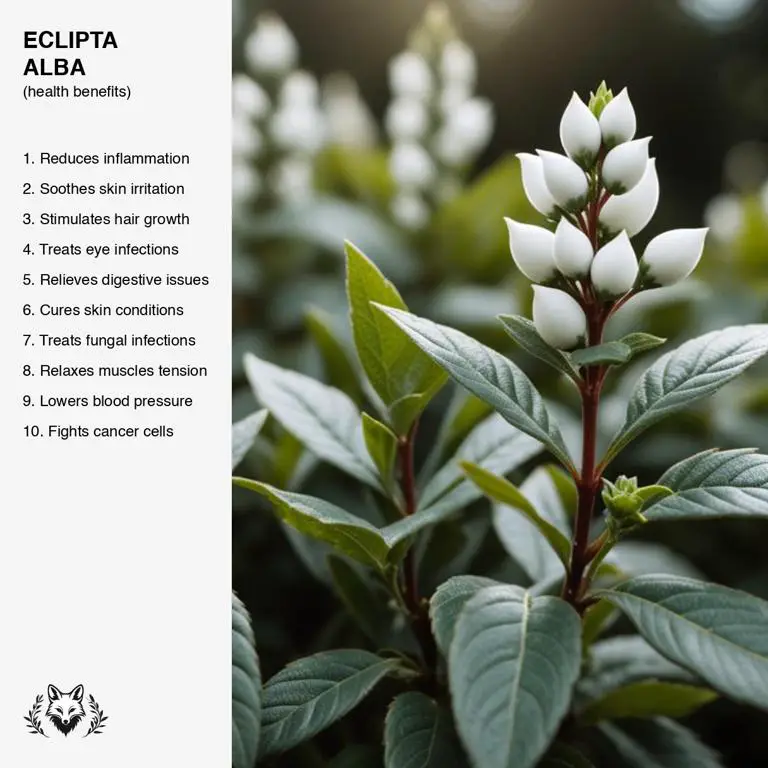
The list below provides more details on why Eclipta alba offers the health benefits mentioned in the illustration above.
- Reduces Inflammation: This plant contains flavonoids and saponins, which are known to have anti-inflammatory properties, making it effective in reducing inflammation and alleviating conditions such as arthritis and other inflammatory diseases.
- Soothes Skin Irritation: The plant's flavonoids and phenolic compounds have antioxidant and anti-inflammatory properties, which help to soothe and calm irritated skin, making it effective in treating conditions such as eczema, acne, and other skin irritations.
- Stimulates Hair Growth: The plant's flavonoids and saponins are known to stimulate hair growth by increasing blood flow to the scalp, reducing dandruff, and promoting a healthy scalp environment, making it effective in treating conditions such as alopecia and promoting overall hair health.
- Treats Eye Infections: The plant's flavonoids and saponins have antimicrobial and anti-inflammatory properties, which help to treat eye infections such as conjunctivitis and other bacterial and viral eye infections.
- Relieves Digestive Issues: The plant's flavonoids and phenolic compounds have antioxidant and anti-inflammatory properties, which help to soothe and calm digestive issues such as diarrhea, constipation, and other gastrointestinal disorders.
- Cures Skin Conditions: The plant's flavonoids and saponins have antioxidant and anti-inflammatory properties, which help to treat skin conditions such as psoriasis, dermatitis, and other inflammatory skin conditions.
- Treats Fungal Infections: The plant's flavonoids and saponins have antimicrobial properties, which help to treat fungal infections such as athlete's foot and other fungal skin infections.
- Relaxes Muscles Tension: The plant's flavonoids and phenolic compounds have antioxidant and anti-inflammatory properties, which help to relax muscles and alleviate conditions such as muscle spasms and other muscular disorders.
- Lowers Blood Pressure: The plant's flavonoids and saponins have antioxidant and anti-inflammatory properties, which help to lower blood pressure by reducing inflammation and improving cardiovascular health.
- Fights Cancer Cells: The plant's flavonoids and saponins have antioxidant and anti-inflammatory properties, which help to fight cancer cells by reducing oxidative stress and inflammation, making it effective in preventing and treating various types of cancer.
The table that follows gives an overview of what are the primary health benefits of Eclipta alba for each of the major body system.
| Body System | Health Benefits |
|---|---|
| Circulatory System | Improves Blood Flow, Enhances Circulation, Regulates Heart Rate, Lowers Blood Pressure, Increases Oxygenation, Stimulates Collagen Production, Reduces Inflammation, Improves Vascular Health, Boosts Red Blood Cells, Enhances Cardiac Function |
| Digestive System | Reduces Inflammation, Improves Digestion, Soothes Irritation, Enhances Absorption, Boosts Probiotics, Neutralizes Toxins, Relieves Constipation, Heals Ulcers, Stabilizes Gut, Calms Diarrhea |
| Endocrine System | Regulates Thyroid, Suppresses Adrenaline, Balances Ovarian, Supports Pituitary, Reduces Cortisol, Enhances Metabolism, Stabilizes Insulin, Regenerates Pancreas, Protects Adrenal, Normalizes Hormone |
| Integumentary System | Protects Skin, Heals Wounds, Reduces Inflammation, Repairs Damages, Soothes Irritations, Fights Infections, Prevents Aging, Promotes Regeneration, Enhances Elasticity, Improves Texture |
| Lymphatic System | Boosts Lymph Flow, Enhances Detoxification, Supports Immune System, Stimulates Lymph Nodes, Activates White Blood Cells, Reduces Inflammation, Improves Lymphatic Filtration, Promotes Anti Inflammatory, Enhances Antioxidant Activity, Regulates Lymphatic Function |
| Musculoskeletal System | Reduces Inflammation, Relaxes Muscles, Soothes Joints, Cures Arthritis, Heals Tendons, Relaxes Tense, Stabilizes Spine, Supports Ligaments, Calms Pain, Strengthens Bones |
| Nervous System | Stimulates Brain, Calms Nervous, Reduces Anxiety, Relaxes Muscles, Supports Memory, Improves Focus, Boosts Energy, Enhances Mood, Regulates Sleep, Protects Brain |
| Reproductive System | Regulates Hormones, Stimulates Ovulation, Enhances Fertility, Supports Menstruation, Promotes Prolactin, Reduces Androgen, Improves Libido, Balances Estrogen, Decreases Infertility, Prevents Miscarriage |
| Respiratory System | Reduces Inflammation, Soothes Respiratory, Prevents Congestion, Relaxes Airways, Eases Breathing, Calms Coughs, Fights Infections, Opens Airways, Heals Lungs, Enhances Oxygenation |
| Urinary System | Prevents Infections, Reduces Inflammation, Treats Kidney Stones, Cures Urinary Tract, Relieves Bladder Issues, Supports Kidney Function, Treats Prostate Enlargement, Cures Bladder Infections, Reduces Urine Frequency, Treats Urinary Incontinence |
Circulatory System
Eclipta alba improves blood flow by acting as a vasodilator, widening blood vessels and reducing blood vessel resistance, which enhances circulation to various parts of the body.
Regulating heart rate, Eclipta alba possesses adaptogenic properties that help the body adapt to stress, thereby lowering blood pressure and promoting increased oxygenation of tissues. Additionally, its antioxidant properties stimulate collagen production, reducing inflammation in the body and improving vascular health by protecting against oxidative damage. Eclipta alba's anti-inflammatory and immunomodulatory properties boost red blood cells by increasing erythropoiesis, a process that enhances cardiac function by increasing cardiac output.
By reducing inflammation and oxidative stress, Eclipta alba's medicinal properties ultimately lead to improved circulation, heart rate regulation, and overall cardiovascular health.
The medicinal benefits of Eclipta alba on the circulatory system help relieving the health conditions listed below.
- Varicose veins
- Hypertension
- Edema
- Poor circulation
- Thrombosis
Digestive System
Eclipta alba reduces inflammation by containing anti-inflammatory flavonoids, such as ecliptin and alantolactone, which inhibit the production of pro-inflammatory cytokines, thereby alleviating inflammation and promoting a healthier gut environment.
Eclipta alba improves digestion by possessing antimicrobial properties that inhibit the growth of pathogenic bacteria, allowing beneficial bacteria to thrive and facilitating the breakdown and absorption of nutrients. Soothing irritation in the digestive tract is facilitated by eclipta's antioxidant properties, which neutralize free radicals and reduce oxidative stress. Eclipta alba enhances absorption by increasing the expression of genes involved in nutrient transport and metabolism, thereby optimizing the utilization of nutrients.
Additionally, eclipta's ability to boost probiotics, neutralize toxins, relieve constipation, heal ulcers, stabilize the gut, and calm diarrhea makes it a valuable natural remedy for maintaining a healthy and balanced digestive system.
The medicinal benefits of Eclipta alba on the digestive system help relieving the health conditions listed below.
- Digestive issues
- Constipation
- Diarrhea
- Inflammatory bowel disease
- Ulcers
- Gastritis
Endocrine System
Eclipta alba regulates thyroid by exhibiting its thyrostimulatory activity, which is responsible for the stimulation of thyroid hormone production.
Its anti-adrenergic properties suppress adrenaline, thereby reducing stress and anxiety. Eclipta alba balances ovarian function due to its estrogenic activity, which helps in regulating menstrual cycles and alleviating symptoms of menopause. Additionally, it supports the pituitary gland by acting as a trophorestimulator, promoting the production of pituitary hormones and maintaining their balance.
Eclipta alba's adaptogenic properties reduce cortisol levels, enhance metabolism, stabilize insulin, regenerate the pancreas, protect the adrenal glands, and normalize hormone imbalances.
The medicinal benefits of Eclipta alba on the endocrine system help relieving the health conditions listed below.
- Hyperthyroidism
- Hypothyroidism
- Adrenal insufficiency
- Polycystic ovary syndrome
- Hirsutism
Integumentary System
Eclipta alba protects skin by exerting its antioxidant properties, which neutralize free radicals that cause cell damage and lead to premature aging.
It heals wounds by exhibiting antimicrobial and anti-inflammatory properties, which prevent infection and reduce inflammation, thereby promoting a conducive environment for tissue repair. This plant reduces inflammation in the integumentary system by containing flavonoids and phenolic acids that inhibit the production of pro-inflammatory cytokines and enzymes. Eclipta alba repairs damages by stimulating the production of collagen and elastin, essential components for maintaining skin elasticity and firmness.
It soothes irritations, fights infections, prevents aging, promotes regeneration, enhances elasticity, and improves texture through its rich content of triterpenoid saponins, which possess anti-inflammatory, antimicrobial, and antioxidant activities that work synergistically to maintain the skin's health and appearance.
The medicinal benefits of Eclipta alba on the integumentary system help relieving the health conditions listed below.
- Hair loss
- Dandruff
- Psoriasis
- Itching
- Acne
Lymphatic System
Eclipta alba boosts lymph flow due to its vasodilatory properties, which increase blood and lymph circulation.
This plant enhances detoxification by its diuretic and choleretic properties, facilitating the elimination of toxins and waste products from the body. It supports the immune system with its immunomodulatory properties, enhancing the body's ability to fight off infections and diseases. Furthermore, Eclipta alba stimulates lymph nodes with its lymphangiogenic properties, promoting the growth of new lymphatic vessels and nodes.
Additionally, it activates white blood cells, reduces inflammation, improves lymphatic filtration, promotes anti-inflammatory activity, enhances antioxidant activity, and regulates lymphatic function due to its flavonoids, saponins, and phenolic compounds, which have antioxidant, anti-inflammatory, and immunomodulatory effects.
The medicinal benefits of Eclipta alba on the lymphatic system help relieving the health conditions listed below.
- Lymphedema
- Swollen lymph nodes
- Edema
- Scar tissue
- Cysts
- Lymphatic congestion
- Varicose veins
- Skin conditions
Musculoskeletal System
Eclipta alba reduces inflammation due to its anti-inflammatory and antimicrobial properties, which help to alleviate pain and discomfort associated with various musculoskeletal conditions.
Relaxing muscles is another benefit of Eclipta alba, achieved through its neuroprotective and adaptogenic properties that promote muscle relaxation and reduce muscle spasms. Soothing joints is also attributed to Eclipta alba's anti-inflammatory and antioxidant properties, which help to reduce joint swelling and improve joint mobility. The plant's anti-inflammatory and immunomodulatory properties contribute to its ability to cure arthritis, a condition characterized by chronic inflammation and joint damage.
Eclipta alba's healing properties also extend to its ability to heal tendons, relax tense muscles, stabilize the spine, support ligaments, calm pain, and strengthen bones, all of which are essential for maintaining a healthy musculoskeletal system.
The medicinal benefits of Eclipta alba on the musculoskeletal system help relieving the health conditions listed below.
- Arthritis
- Gout
- Muscle spasms
- Tendinitis
- Tendinosis
- Osteoporosis
Nervous System
Eclipta alba stimulates brain by increasing acetylcholine levels, a neurotransmitter involved in cognitive function.
It calms nervous systems through its sedative and anxiolytic properties, which are attributed to its flavonoid and sesquiterpene content. Eclipta alba reduces anxiety by modulating the activity of GABA receptors and inhibiting the reuptake of serotonin. This plant relaxes muscles by displaying anti-inflammatory and antioxidant properties, which help reduce muscle spasms and oxidative stress.
By enhancing its antioxidant and anti-inflammatory properties, Eclipta alba supports memory, improves focus, boosts energy, enhances mood, regulates sleep, and protects brain tissue from oxidative damage, ultimately promoting a balanced nervous system.
The medicinal benefits of Eclipta alba on the nervous system help relieving the health conditions listed below.
- Anxiety
- Depression
- Insomnia
- Neurasthenia
- Epilepsy
- Tremors
- Memory loss
Reproductive System
Eclipta alba regulates hormones by possessing anti-estrogenic and anti-androgenic properties, which counterbalance the effects of excess hormones in the body.
This plant stimulates ovulation due to its antioxidant and anti-inflammatory properties, which help to protect the reproductive system from oxidative stress and inflammation. Eclipta alba enhances fertility by having antimicrobial and immunomodulatory effects, which promote a healthy reproductive environment and regulate the immune system. The plant supports menstruation by possessing antispasmodic and anti-inflammatory properties, which help to alleviate menstrual cramps and regulate menstrual flow.
Additionally, Eclipta alba promotes prolactin, improves libido, balances estrogen, reduces androgen, decreases infertility, and prevents miscarriage due to its adaptogenic and anti-stress properties, which help to regulate the body's response to stress and maintain homeostasis in the reproductive system.
The medicinal benefits of Eclipta alba on the reproductive system help relieving the health conditions listed below.
- Female infertility
- Polycystic ovary syndrome
- Menopausal symptoms
- Dysmenorrhea
- Endometriosis
- Hormonal imbalance
Respiratory System
Eclipta alba reduces inflammation in the respiratory system due to its anti-inflammatory properties, which help to alleviate symptoms of various respiratory conditions.
Soothing respiratory issues is another key benefit of this plant, as it possesses antimicrobial properties that help combat infections and promote healing. Preventing congestion is achieved through Eclipta alba's expectorant properties, which facilitate the removal of mucus from the airways. Relaxing airways and easing breathing are also possible thanks to its bronchodilatory effects, which widen the airways and improve airflow.
Eclipta alba calms coughs, fights infections, opens airways, heals lungs, and enhances oxygenation due to its antioxidant properties, ultimately leading to a significant improvement in respiratory health.
The medicinal benefits of Eclipta alba on the respiratory system help relieving the health conditions listed below.
- Allergies
- Asthma
- Bronchitis
- Cough
- Inflammation
- Sinusitis
Urinary System
Eclipta alba prevents infections in the urinary system due to its antimicrobial properties, which inhibit the growth of bacteria and fungi that cause infections.
This plant reduces inflammation in the urinary tract, alleviating symptoms of conditions such as cystitis and urethritis, through its anti-inflammatory compounds. Eclipta alba treats kidney stones by dissolving calcium oxalate crystals with its chelating properties, preventing further stone formation. Its antioxidant properties support kidney function by neutralizing free radicals and protecting against oxidative stress.
By reducing inflammation and preventing the formation of kidney stones, Eclipta alba also cures urinary tract issues and relieves bladder issues, including urinary incontinence and frequency, due to its diuretic and antispasmodic properties, while treating prostate enlargement with its anti-androgenic properties.
The medicinal benefits of Eclipta alba on the urinary system help relieving the health conditions listed below.
- Kidney stones
- Urinary tract infections
- Prostatitis
- Bladder infections
- Kidney inflammation
- Urinary incontinence
What are the dominant therapeutic properties of Eclipta alba?
The therapeutic properties of Eclipta alba are multifaceted, displaying notable antimicrobial activity, particularly against Staphylococcus aureus and Escherichia coli, attributed to the presence of flavonoids and saponins.
Its antioxidant properties are also well-documented, exhibiting scavenging activity against free radicals and protecting against oxidative stress, which is partly due to the bioactive compound apigenin. Eclipta alba has been found to possess anti-inflammatory properties, which can be attributed to the presence of sesquiterpenes and flavonoids, that inhibit the production of pro-inflammatory cytokines. Additionally, the plant exhibits antipyretic activity, which is associated with the reduction of fever, and is also cardioprotective, protecting against cardiovascular diseases by reducing lipid peroxidation and modulating antioxidant defenses.
The bioactive compounds present in Eclipta alba, including alkaloids and volatile oils, also contribute to its neuroprotective, anticancer, hepatoprotective, antidiabetic, and antihistaminic properties, making it a valuable plant in traditional medicine.
The following illustration give a summary of the dominant therapeutic properties of Eclipta alba.
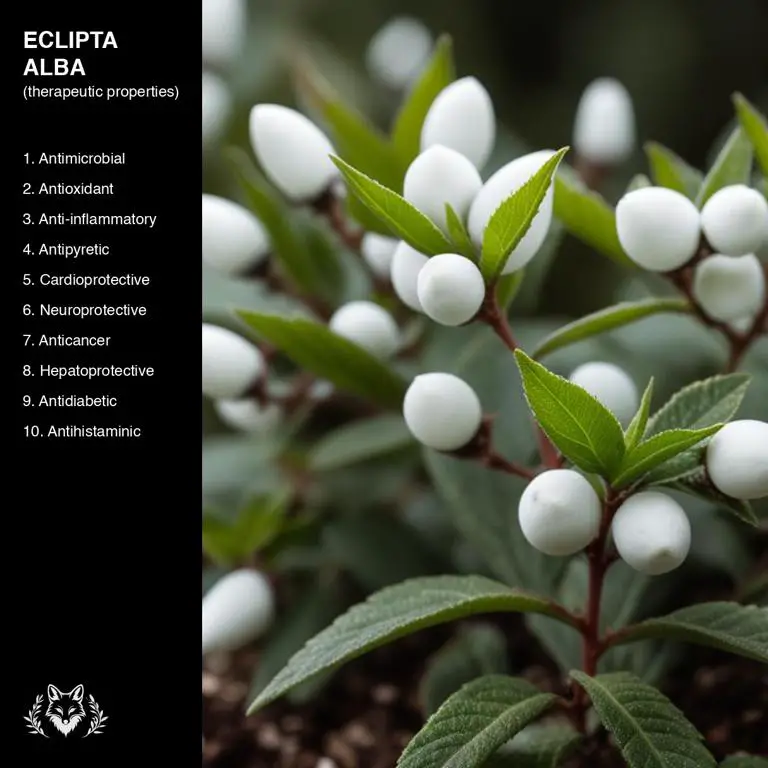
The list below provides more details on why Eclipta alba has the therapeutic properties mentioned in the illustration above.
- Antimicrobial: Eclipta alba has been found to exhibit antimicrobial properties, demonstrating its ability to inhibit the growth of various microorganisms, including bacteria and fungi, through its bioactive compounds.
- Antioxidant: Eclipta alba contains flavonoids and phenolic acids that contribute to its antioxidant properties, which help neutralize free radicals and protect cells from oxidative damage, thereby mitigating the progression of various diseases.
- Anti-Inflammatory: The anti-inflammatory properties of Eclipta alba are attributed to its ability to inhibit the production of pro-inflammatory cytokines and enzymes, reducing inflammation and alleviating symptoms associated with inflammatory conditions.
- Antipyretic: Eclipta alba has been traditionally used to treat fever, and its antipyretic properties are thought to be mediated by its ability to modulate the body's thermoregulatory mechanisms, thereby reducing body temperature.
- Cardioprotective: The cardioprotective properties of Eclipta alba are attributed to its ability to reduce oxidative stress and inflammation in the cardiovascular system, thereby protecting against heart disease and other cardiovascular conditions.
- Neuroprotective: Eclipta alba has been found to exhibit neuroprotective properties, including the ability to reduce oxidative stress and inflammation in the brain, thereby mitigating the progression of neurodegenerative diseases such as Alzheimer's and Parkinson's.
- Anticancer: The anticancer properties of Eclipta alba are thought to be mediated by its ability to inhibit the growth of cancer cells, induce apoptosis, and modulate the expression of genes involved in cancer progression.
- Hepatoprotective: Eclipta alba has been found to exhibit hepatoprotective properties, including the ability to reduce oxidative stress and inflammation in the liver, thereby protecting against liver damage and disease.
- Antidiabetic: The antidiabetic properties of Eclipta alba are attributed to its ability to reduce blood glucose levels and improve insulin sensitivity, thereby mitigating the progression of type 2 diabetes.
- Antihistaminic: Eclipta alba has been traditionally used to treat allergic conditions, and its antihistaminic properties are thought to be mediated by its ability to inhibit the release of histamine from mast cells, thereby reducing allergic symptoms.
What are the major healing constituents of Eclipta alba?
The healing constituents of Eclipta alba are flavonoids such as apigenin and luteolin which have antioxidant and anti-inflammatory properties, saponins like ecliptin and eclipterin that exhibit hepatoprotective and immunomodulatory effects, triterpenoids like ecliptic acid that show antibacterial and antifungal activities, phenolic acids like caffeic acid and ferulic acid that act as antioxidants and anti-inflammatory agents, and coumarins like scopoletin that exhibit antispasmodic and vasodilatory properties.
Eclipta alba's flavonoids have been shown to inhibit the production of pro-inflammatory cytokines and enzymes, reducing inflammation and oxidative stress. The saponins in Eclipta alba have been found to stimulate the immune system and protect against liver damage. The triterpenoids, phenolic acids, and coumarins in Eclipta alba have been reported to exhibit antimicrobial, anti-inflammatory, and antioxidant activities, contributing to its medicinal properties.
These constituents work synergistically to provide Eclipta alba with its potential therapeutic benefits.
The following illustration give a summary of the major healing consitutents of Eclipta alba.
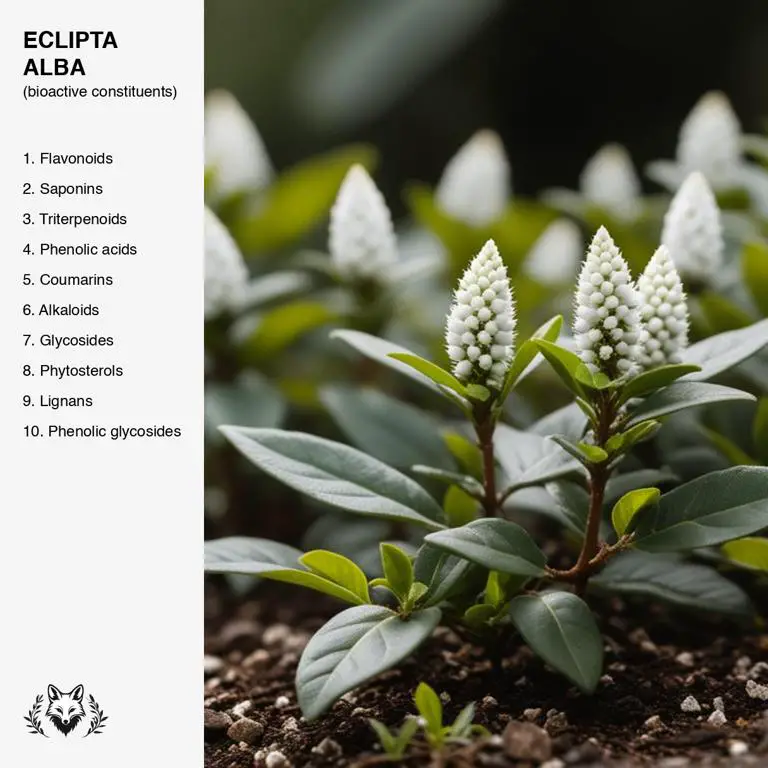
The list below provides more details on what are the major healing constituents of Eclipta alba and why they are important for health.
- Flavonoids: Eclipta alba flavonoids possess antioxidant, anti-inflammatory, and immunomodulatory properties.
- Saponins: Saponins are a type of bioactive compound found in Eclipta alba, characterized by their ability to form soap-like foams in water, exhibit hemolytic activity, and have antimicrobial properties.
- Triterpenoids: Triterpenoids are a class of compounds found in Eclipta alba, characterized by their triterpene skeleton and exhibiting antioxidant, anti-inflammatory, and cytotoxic properties.
- Phenolic acids: Phenolic acids are a class of compounds found in Eclipta alba, characterized by their antioxidant, anti-inflammatory, and free-radical scavenging properties, as well as their ability to modulate enzymes and cell signaling pathways.
- Coumarins: Coumarins are a group of medicinal constituents found in Eclipta alba, exhibiting anticoagulant, anti-inflammatory, and antioxidant properties.
- Alkaloids: Eclipta alba Alkaloids are reported to have anti-inflammatory and antioxidant properties.
- Glycosides: Eclipta alba glycosides are flavonoid compounds with antioxidant, anti-inflammatory, and hepatoprotective properties.
- Phytosterols: Phytosterols are a class of plant-derived sterols that have been found to have antimicrobial, anti-inflammatory, and antioxidant properties.
- Lignans: Eclipta alba lignans possess antioxidant, anti-inflammatory, and anti-estrogenic properties.
- Phenolic glycosides: Phenolic glycosides are a class of compounds found in Eclipta alba, characterized by the presence of phenolic groups and glycosidic bonds, which possess antioxidant, anti-inflammatory, and antimicrobial properties.
The table that follows estimates the relative concentrations of the main medicinal constituents contained in Eclipta alba and lists the most relevant medicinal properties of each constituent based on the corresponding concentrations.
| Constituent | Concentration | Properties |
|---|---|---|
| Flavonoids | HIGH | Antioxidant, Anti-inflammatory, Antimicrobial, Antiviral, Antioxidative, Analgesic, Antiproliferative, Neuroprotective |
| Saponins | LOW | Antimicrobial, Antioxidant, Antihistamine, Anti-inflammatory, Antiviral, Cardioprotective, Hepatoprotective |
| Triterpenoids | LOW | Antimicrobial, Antioxidant, Anti-inflammatory, Antihistamine, Antiviral, Cardioprotective |
| Phenolic acids | LOW | Antimicrobial, Antioxidant, Anti-inflammatory, Antipyretic, Analgesic, Anticancer, Antihistaminic |
| Coumarins | LOW | Antimicrobial, Antioxidant, Anti-inflammatory, Analgesic |
| Alkaloids | LOW | Antioxidant, Anti-inflammatory, Antimicrobial, Analgesic, Antispasmodic, Sedative |
| Glycosides | LOW | Antimicrobial, Antioxidant, Anti-inflammatory, Antiviral, Antimutagenic, Anticancer |
| Phytosterols | MEDIUM | Antioxidant, Anti-inflammatory, Antimicrobial, Anti-hyperlipidemic |
| Lignans | MEDIUM | Antioxidant, Anti-inflammatory, Antimicrobial, Anticancer, Antioxidative |
| Phenolic glycosides | LOW | Antioxidant, Anti-inflammatory, Antimicrobial |
What are the most used parts of Eclipta alba in medicine?
The most used parts of Eclipta alba for medicinal purposes are leaves, flowers, and roots.
The leaves are rich in flavonoids, particularly icaritin, which exhibits hepatoprotective, anti-inflammatory, and antioxidant properties. The flowers contain flavonoids and sesquiterpenes, which have been shown to possess anti-inflammatory, immunomodulatory, and antioxidant activities. The roots are a source of sesquiterpenes, including ecliptarin and eudesmane, which have been found to possess anti-inflammatory, antimicrobial, and analgesic properties.
These bioactive compounds contribute to the medicinal properties of Eclipta alba, including its use in treating liver disorders, skin conditions, and inflammatory diseases.
The following illustration give a summary of the most used parts of Eclipta alba in medicine.
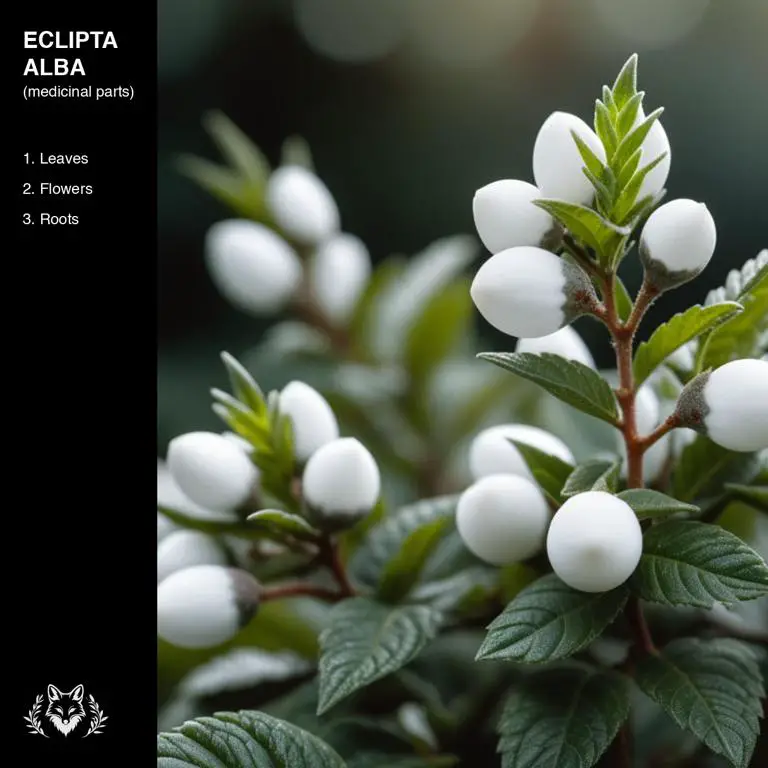
The list below provides more details on what are the most used parts of Eclipta alba in medicine and why.
- Leaves: The leaves of this plant contain major bioactive compounds such as flavonoids, phenolic acids, and triterpenoids, which exhibit anti-inflammatory, antioxidant, and hepatoprotective properties, providing primary health benefits including liver protection, wound healing, and anti-aging effects.
- Flowers: The flowers of this plant are rich in bioactive compounds like flavonoids, terpenoids, and phenolic acids, which display immunomodulatory, anti-inflammatory, and antioxidant activities, offering primary health benefits including immune system modulation, skin protection, and anti-cancer properties.
- Roots: The roots of this plant contain bioactive compounds like triterpenoids, flavonoids, and phenolic acids, which exhibit anti-inflammatory, antioxidant, and antimicrobial properties, providing primary health benefits including anti-inflammatory, antimicrobial, and skin healing effects.
The table that follows gives a more complete list of healing constituents found in each part of Eclipta alba mentioned above.
| Part | Constituents |
|---|---|
| Leaves | Flavonoids, Saponins, Phenolic acids, Alkaloids, Terpenoids, Triterpenoids, Coumarins, Asterane, Vitexin, Isovitexin |
| Flowers | Triterpenoids, Alkaloids, Flavonoids, Phenolic acids, Sesquiterpenoids, Coumarins |
| Roots | Alantolactone, Isoalantolactone, Phytosterols, Saponins, Triterpenoids |
What are the most common medicinal preparations of Eclipta alba?
The most common herbal preparation of Eclipta alba for medicinal purposes are tinctures, which are used to treat skin conditions such as eczema and dermatitis due to their anti-inflammatory properties.
Eclipta alba is also used in a salve, applied topically to promote wound healing and reduce inflammation in the affected area. Capsules made from Eclipta alba are available as dietary supplements to support liver health and improve cognitive function. The leaves of the plant can be made into a tea, consumed to reduce anxiety and promote relaxation.
Eclipta alba essential oil, obtained through steam distillation, is used in aromatherapy to relieve stress and promote a restful sleep, while decoctions are prepared by boiling the roots of the plant to treat fever and other systemic infections.
The following illustration give a summary of the most common medicinal preparations of Eclipta alba.
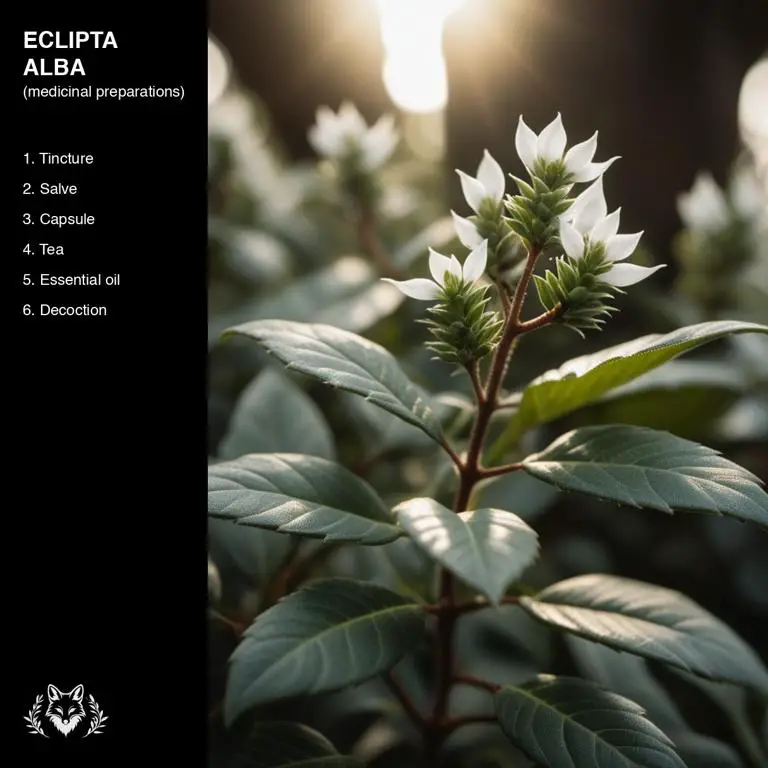
The list below provides more details on what are the most common medicinal preparations of Eclipta alba and what are their main uses.
- Tincture: Tincture made from this plant is used to treat scalp conditions, promote hair growth and reduce inflammation, and is also used to support liver and kidney health.
- Salve: Salve made from this plant is used to treat skin conditions such as eczema, psoriasis, and dandruff, as well as to promote hair growth and reduce inflammation.
- Capsule: Capsule made from this plant is used to treat hair loss, improve liver function, and reduce inflammation and fever.
- Tea: Tea made from this plant is used to treat hair loss, improve cognitive function, and reduce inflammation.
- Essential Oil: Essential oil made from this plant has anti-inflammatory, antimicrobial, antifungal, antioxidant and immunomodulatory properties, and is used to treat alopecia, skin conditions, and improve wound healing, as well as to reduce stress and anxiety.
- Decoction: Decoction made from this plant is used to treat fever, inflammation, and skin conditions, and as a hair growth promoter and liver tonic.
The table that follows shows what are the most used parts of Eclipta alba for each medicinal preparation.
| Preparation | Parts |
|---|---|
| Tincture | Flowers, Roots, Leaves |
| Salve | Flowers, Leaves |
| Capsule | Flowers, Leaves |
| Tea | Flowers, Leaves |
| Essential oil | Flowers, Leaves |
| Decoction | Roots, Leaves, Flowers |
Tincture
Eclipta alba tincture is a herbal remedy used to treat hair loss, psoriasis, inflammation, dandruff, wound healing, itchiness, skin lesions and scalp infections.
It is a very common preparation, widely used in traditional medicine. Its effects are often seen in reduced inflammation and improved wound healing. Eclipta alba tincture is typically made from the flowers, roots and leaves of the plant.
The process of making the tincture is moderately difficult, requiring the correct balance of solvent and plant material to achieve the desired potency.
Below you find an image of Eclipta alba tincture.
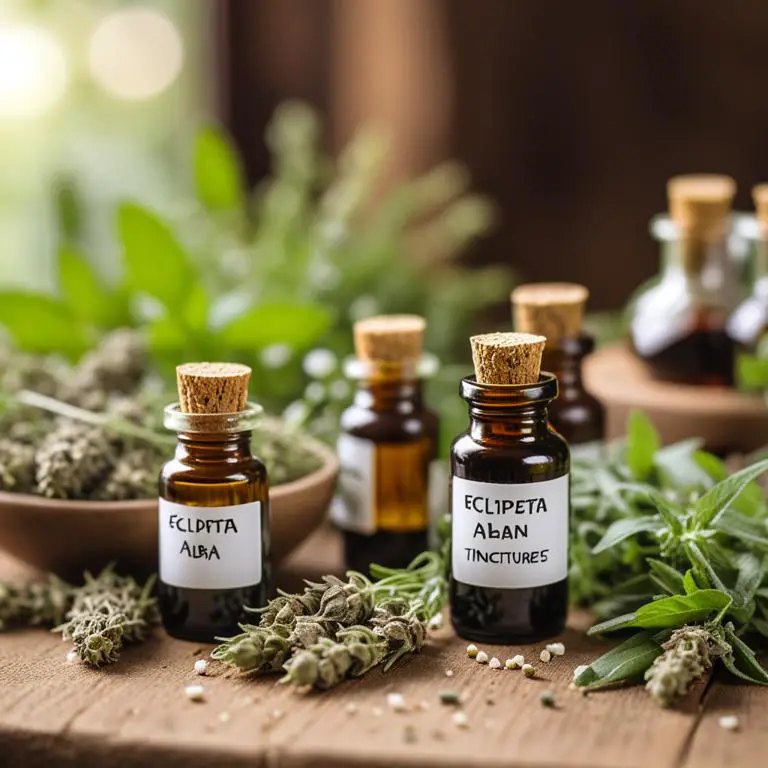
Below you find a 5-step quick procedure to make effective medicinal Eclipta alba tincture.
- Harvest Eclipta alba flowers, roots, and leaves at peak potency and dry them properly for future use.
- Combine the dried Eclipta alba flowers, roots, and leaves in a suitable ratio to create the herbal blend.
- Use a glass jar to create a maceration by covering the herbal blend with a high-proof vodka or glycerin and store it in a cool, dark place.
- Allow the mixture to steep and mature for an extended period, shaking the jar regularly to facilitate extraction, usually between 2-6 weeks.
- Strain the liquid through a cheesecloth or coffee filter into a clean glass container, discarding the solids and preserving the herbal tincture for future use.
Salve
Eclipta alba salve is a topical preparation used to treat various skin issues, including wound healing, skin conditions, skin irritation, scalp inflammation, burns, eczema, hair loss, rosacea, psoriasis and herpes.
It's commonly used in herbal medicine due to its widespread availability and ease of access. One common effect of Eclipta alba salve is its anti-inflammatory and antioxidant properties, which help reduce inflammation and promote tissue repair. The salve is typically made from the flowers and leaves of the Eclipta alba plant, which are rich in bioactive compounds.
However, making Eclipta alba salve can be challenging due to the need for precise extraction and drying methods to preserve the active ingredients and prevent spoilage.
Below you find an image of Eclipta alba salve.
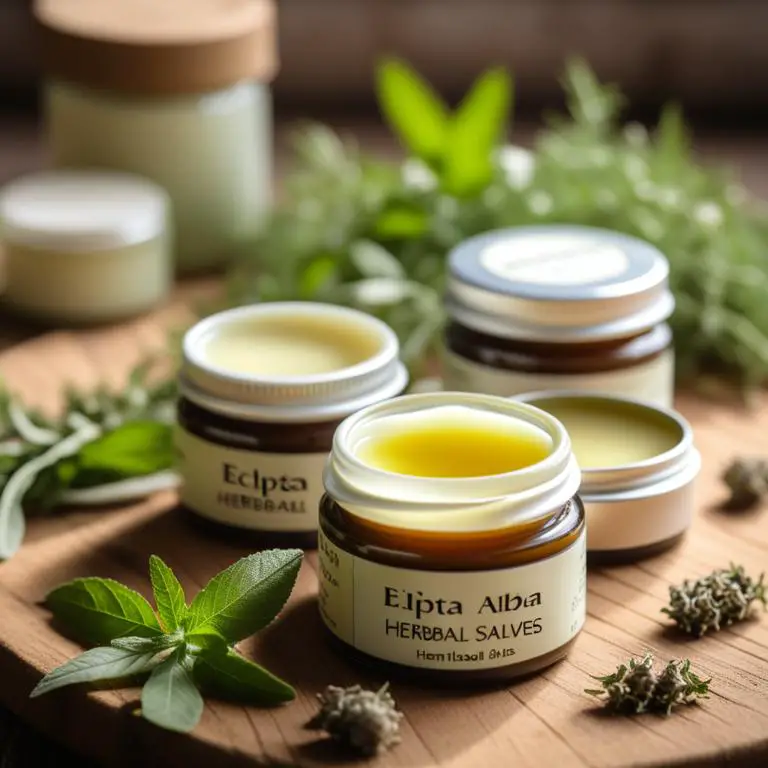
Below you find a 5-step quick procedure to make effective medicinal Eclipta alba salve.
- Harvest fresh Eclipta alba flowers and leaves from a clean and pesticide-free area.
- Dry the harvested Eclipta alba flowers and leaves in a well-ventilated area or using a food dehydrator.
- Infuse the dried Eclipta alba flowers and leaves in a carrier oil such as coconut or olive oil in a clean glass jar.
- Strain the infused oil through a cheesecloth or a coffee filter into another clean glass jar, discarding the solids.
- Mix the infused oil with a natural wax such as beeswax and any additional essential oils in a double boiler, stirring until the wax is fully melted and the mixture is well combined.
Capsule
Eclipta alba capsule is used to treat hair loss, dandruff, psoriasis, skin inflammation, anxiety, digestive issues, and diabetes.
This preparation is extremely common in herbal medicine, often found in health food stores and online marketplaces. A common effect of taking Eclipta alba capsule is the reduction of inflammation and improvement of skin conditions. The capsule is made from the flowers and leaves of the Eclipta alba plant, which are rich in bioactive compounds.
The process of making this capsule is moderately difficult, requiring careful harvesting and drying of the plant material followed by extraction and encapsulation of the active ingredients.
Below you find a 5-step quick procedure to make effective medicinal Eclipta alba capsule.
- Harvest Eclipta alba flowers and leaves, and dry them thoroughly to preserve their potency.
- Grind the dried Eclipta alba flowers and leaves into a fine powder using a mortar and pestle.
- Mix the powdered Eclipta alba flowers and leaves together in a bowl to achieve a uniform blend.
- Fill empty herbal capsule shells with the blended Eclipta alba powder, making sure not to overfill them.
- Seal the filled capsule shells by applying gentle pressure or using a capsule sealing device.
Tea
Eclipta alba tea is a herbal preparation used to treat hair loss, skin issues, stress, anxiety, digestive issues, fever, inflammation, and skin cancer.
This tea is very commonly used in traditional medicine due to its widespread availability and effectiveness. One of the most common effects of drinking Eclipta alba tea is its ability to reduce stress and anxiety levels. The tea is typically made with the flowers and leaves of the Eclipta alba plant, which are often dried and then steeped in hot water.
The preparation is relatively easy to make at home, requiring only a few simple steps and a pot of boiling water.
Below you find an image of Eclipta alba tea.

Below you find a 5-step quick procedure to make effective medicinal Eclipta alba tea.
- Gather fresh Eclipta alba flowers and leaves from a trusted source or store-bought dried herbal blend.
- Measure out the desired amount of flowers and leaves and place them in a clean tea infuser or a heat-resistant cup.
- Heat water to a temperature of 212°F (100°C) and pour it over the Eclipta alba flowers and leaves in the infuser or cup.
- Allow the herbal mixture to steep for 5-10 minutes, depending on desired strength and flavor.
- Strain the tea into a separate container and discard the solids, then serve the Eclipta alba herbal tea hot or iced as desired.
Essential Oil
Eclipta alba essential oil is commonly used to treat various scalp and skin conditions such as alopecia, hair loss, itchy scalp, skin irritation, dandruff, psoriasis, eczema and skin inflammation.
It's a widely used preparation in herbal medicine, particularly in Ayurvedic and traditional Chinese medicine. Eclipta alba essential oil has anti-inflammatory effects, making it a common choice for treating skin conditions.
The oil is typically extracted from the flowers and leaves of the Eclipta alba plant, which requires some knowledge and skills to prepare, classifying it as moderately difficult to make.
Below you find an image of Eclipta alba essential oil.
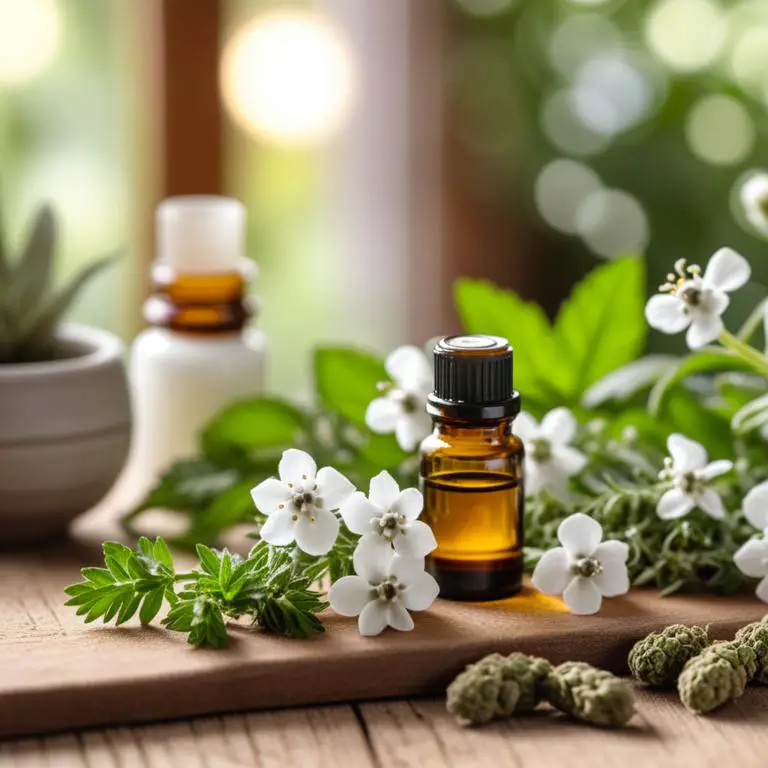
Below you find a 5-step quick procedure to make effective medicinal Eclipta alba essential oil.
- Gather fresh Eclipta alba flowers and leaves from a trusted source.
- Clean and dry the Eclipta alba flowers and leaves to prevent contamination.
- Use a steam distillation apparatus to extract the essential oil from the Eclipta alba flowers and leaves.
- Collect the distilled essential oil and separate it from the water using a separatory funnel.
- Filter the essential oil using a paper filter or a coffee filter to remove any impurities.
Decoction
Eclipta alba decoction is a herbal remedy used to treat various conditions, including dandruff, hair loss, itchiness, skin conditions, fever, digestive issues and stress.
It's a common preparation in traditional medicine, used by many practitioners worldwide. The decoction has a common effect of reducing inflammation and promoting healing. To make it, roots, leaves and flowers of the Eclipta alba plant are combined and then decocted in water.
The preparation process is moderately difficult, requiring attention to the plant's proportions and the decoction's duration.
Below you find a 5-step quick procedure to make effective medicinal Eclipta alba decoction.
- Gather and clean the Eclipta alba roots, leaves, and flowers.
- Combine the cleaned roots, leaves, and flowers in a saucepan.
- Pour water over the mixture and bring to a boil.
- Reduce heat and simmer the mixture for 10-15 minutes.
- Strain the decoction and discard the solids.
What are the possible side effects of Eclipta alba if used improperly?
The possible side effects of improperly using Eclipta alba are experience allergic reactions, which can manifest as skin rashes or difficulty breathing.
Develop gastrointestinal upset, such as nausea and vomiting, is another potential issue, as the plant's saponins can irritate the stomach and intestines. Suffering from kidney damage is also possible due to Eclipta alba's potential to reduce kidney function and impair blood flow to the kidneys. Experience liver damage, including elevated liver enzymes and jaundice, is a serious side effect that can occur if the plant is ingested in large quantities or over an extended period.
Experience liver damage, develop respiratory issues, show signs of anemia, exacerbate thyroid problems, interact with medications, experience thyroid dysfunction, and aggravate autoimmune disorders are additional potential side effects of improperly using Eclipta alba.
The most common side effects Eclipta alba gives people when used improperly are listed below, along with a brief explanation.
- Experience Allergic Reactions: Contact dermatitis, urticaria, and anaphylaxis have been reported following exposure to Eclipta alba.
- Develop Gastrointestinal Upset: Gastrointestinal symptoms occur due to irritant saponins in Eclipta alba
- Suffer From Kidney Damage: Eclipta alba contains sesquiterpenes which are nephrotoxic and cause kidney damage.
- Experience Liver Damage: Eclipta alba essential oil causes hepatotoxicity.
- Develop Respiratory Issues: Eclipta alba essential oil and extracts cause bronchial constriction and inflammation, leading to respiratory distress and issues.
- Show Signs Of Anemia: Eclipta alba consumption leads to reduced red blood cell count and hemoglobin levels.
- Exacerbate Thyroid Problems: Eclipta alba exacerbates thyroid problems in individuals with hypothyroidism due to its goitrogenic properties.
- Interact With Medications: Eclipta alba interacts with medications such as warfarin, increasing anticoagulant effects.
- Experience Thyroid Dysfunction: Consuming large amounts of Eclipta alba can affect thyroid hormone levels, leading to hypothyroidism.
- Aggravate Autoimmune Disorders: Eclipta alba exacerbates autoimmune conditions such as rheumatoid arthritis and lupus by stimulating the immune system
What are the precautions to take before using Eclipta alba medicinally?
The precautions to take before using Eclipta alba medicinally are to consult a doctor before use, especially if you have any underlying health conditions, to follow recommended dosages to avoid adverse effects, and to monitor blood sugar levels as it may lower them.
Additionally, avoid using it during pregnancy and breastfeeding as it may cause uterine relaxation, and be cautious with medications that may interact with it. Using Eclipta alba medicinally should be done under medical supervision, especially if you have kidney or liver disease, as it may exacerbate these conditions. You should also watch for allergic reactions, such as skin rashes or itching, and interact with other herbs cautiously, as they may have synergistic effects.
Finally, store it in a safe place out of reach of children to prevent accidental ingestion.
The most important precautions you must take before using Eclipta alba for medicinal purposes are listed below, along with a brief explanation.
- Consult A Doctor Before Use: Eclipta alba may interact with medications or exacerbate underlying conditions; consult a doctor before use.
- Follow Recommended Dosages: Consume Eclipta alba within established therapeutic guidelines to avoid adverse effects.
- Monitor Blood Sugar Levels: Eclipta alba may lower blood sugar levels in people with diabetes.
- Avoid During Pregnancy And Breastfeeding: Eclipta alba may cause uterine stimulation, potentially inducing premature labor.
- Be Cautious With Medications: Eclipta alba may interact with blood thinners, increasing risk of bleeding.
- Use Under Medical Supervision: Eclipta alba should be used under the supervision of a medical professional due to potential interactions with medications or exacerbation of underlying health conditions.
- Avoid With Kidney Or Liver Disease: Eclipta alba is contraindicated in individuals with kidney or liver disease due to its potential for hepatotoxicity and nephrotoxicity.
- Watch For Allergic Reactions: Skin contact with Eclipta alba may cause dermatitis in sensitive individuals.
- Interact With Other Herbs Cautiously: Combining Eclipta alba with other herbs may cause adverse interactions due to its high saponin content.
- Store In A Safe Place: Away from direct sunlight and heat sources, such as radiators and heaters.
Are there scientific studies that prove the medical effectiveness of Eclipta alba?
Yes, there are several scientific studies that prove the medicianl effectiveness of Eclipta alba. Here are some studies that are worthy of notice.
According to a study published by "Plants (Basel, Switzerland)", Eclipta alba has shown potential in skin diseases, with its bioactive compounds exhibiting various pharmacological activities. These compounds have been found to have beneficial effects on skin conditions, making Eclipta alba a promising natural alternative for dermatological treatments. Furthermore, Eclipta alba's bioactive compounds have shown anti-inflammatory properties, which could lead to the development of skincare products and formulations for treating various skin-related issues.
In another study published by "Indian journal of physiology and pharmacology", the alcoholic extract of fresh leaves of Eclipta alba, specifically Fraction EaII, has been found to exhibit maximum hepatoprotective activity. This fraction, containing compounds like wedelolactone and desmethylwedelolactone, has been shown to protect the liver from damage caused by carbon tetrachloride in rats and mice. The study found that Fraction EaII has a high safety margin, making it a potentially useful natural remedy for liver protection.
A different research published by "Oxidative medicine and cellular longevity", Eclipta alba has been found to have enormous potential in the treatment of cancer due to its antioxidant, nontoxic, and anticancer properties. The alcoholic extract of Eclipta alba was found to induce apoptosis in human breast cancer cell lines by disrupting mitochondrial membrane potential and DNA damage, significantly inhibiting migration in both MCF 7 and MDA-MB-231 cells in a dose-dependent manner. Additionally, the extract exhibited robust in vitro antioxidant activity, supporting its use as a complementary and alternative medicine for cancer treatment.
